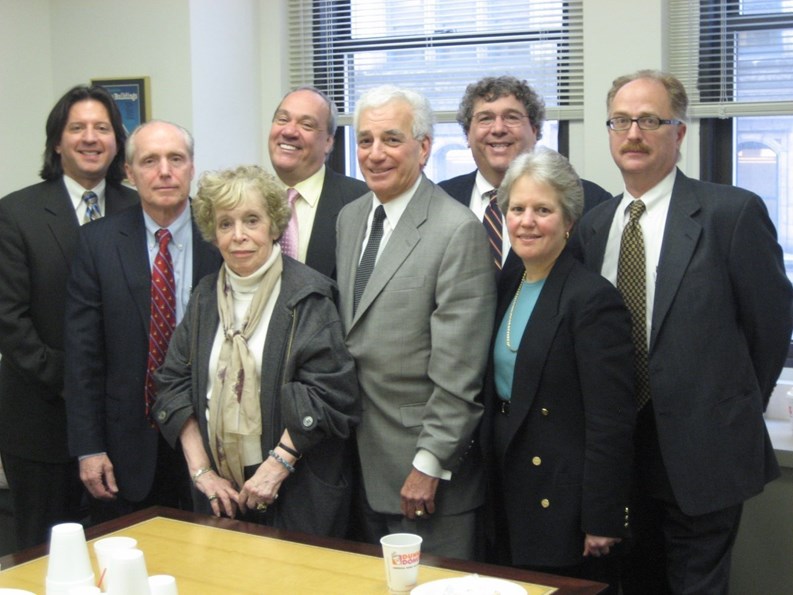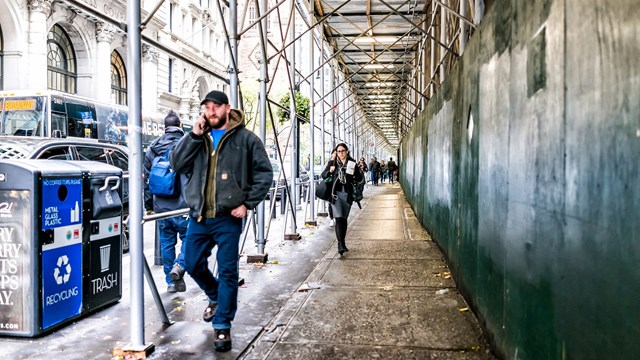The Cooperator headquarters in Midtown Manhattan again played host to a group of real estate industry professionals gathered to discuss their strategies and challenges, trade anecdotes (both the positive and not-so-positive), and meet their colleagues over breakfast. This time, the assembled group was composed of legal professionals specializing in co-op and condominium law and recent changes to the 80/20 rule provided some interesting food for thought.
Attendees included Al Pennisi, a partner with the Queens law firm of Pennisi Daniels & Norelli LLP, and president of the Federation of New York Housing Cooperatives and Condominiums (FNYHC); Greg Carlson of Carlson Property Management and the Federation's executive director; Mona Shyman, management consultant and Federation vice president; Marc S. Bresky, an attorney based in Elmhurst, Queens; Robert Chicco of the Mineola-based law firm of Forchelli Curto Schwartz Mineo Carlino & Cohn LLP; Geoffrey Mazel, an attorney with Hankin Handwerker & Mazel PLLC in Manhattan; Orsid Realty's Neil Davidowitz, a lawyer and property manager; and Phyllis Weisberg of the law firm of Kurzman Karelsen & Frank, LLP in Manhattan.
Big Changes in 80/20
At the top of the roundtable agenda was the so-called "80/20 rule," which for decades has stipulated that co-op buildings must derive fully 80 percent of their annual income directly from shareholders, and no more than 20 percent from other sources (such as retail tenants). Co-ops on the wrong side of 80/20 forfeited valuable tax benefits for shareholders—but now, the rules have changed in favor of co-ops.
Pennisi explained that Internal Revenue Code 216 was amended in December of 2007 changing forever what had been commonly known as the 80/20 rule. For years, the Federation, and its sister organization, the Council of New York Cooperatives and Condominiums (CNYC), and Congressman Charles B. Rangel, D-15, had been trying to change the rule on behalf of the city's cooperatives.
Congressman Rangel, added Pennisi, had promised that if he ever got into a position of power, he would help to amend the rule, and he did. The legislation went through under the radar as an amendment to the Mortgage Forgiveness Debt Relief Act (HR 3648). Following amendments by the Senate, President George W. Bush signed it into law December 20, 2007.
Pennisi went on to say that co-ops now have a "three-prong" test to determine whether or not they're 80/20 compliant. "The first test is that 80 percent or more of the cooperative's gross income must be devised from tenant-shareholders; the second test is that 80 percent or more of the total square footage of the corporation's property must be used or available for use by the tenant-shareholders for residential purposes. The third test requires that 90 percent or more of the expenditures paid during the taxable year be for the acquisition of construction, maintenance, or other services for the benefit of the tenant-shareholders."
The assembled professionals felt that after years of coming up with creative strategies for dealing with 80/20, the limitations have been lifted to a much more reasonable, less-onerous level.
"I for one have seen some of our co-ops with commercial spaces looking at their leases," said Pennisi. "Now we're trying to determine if we can collect more rent, because up to now, we reduced the rent artificially—especially in Manhattan."
"I have client in Manhattan that's a small building with a large garage," added Mazel. "What's happened is that they have a lease that generates a tremendous amount of revenue. Those adjustments are made on an annual basis, and they want me to revisit the lease in light of the new changes in the law… Commercial leases are going to be re-examined."
"We've been retaining our architects to give us a certified letter just to put in the file for our accountants reflecting the fact that we pass the new test on the square footage basis," said Davidowitz. "Simply by saying that the aggregate square footage of the residential component is "X square feet" and the commercial is "Y square feet," we meet the test—but we may have to do some more accurate floor plans of the commercial space just to put our files together."
For her part, Weisberg expressed some reservations about how the current shaky economic climate could impact retail tenants in the city's residential co-ops. "Some of these commercial tenants in 80/20 buildings have managed to be viable because they're not really paying market rent," she said. "And as we go through a downturn in the real estate market, we may end up with vacant spaces."
"We've been trying to change this law for 27 years," said Davidowitz. "We've found ways around it—all kinds of tricks and smoke and mirrors—and it's going to take some time before the smoke settles and we find out exactly where it is going."
The Demons of Default
With record-breaking incidences of mortgage defaults all over the news and a distinct feeling of dread among both lenders and many homeowners, the issue of arrears and defaults came up early in the roundtable discussion. Whereas some of the assembled attorneys said they hadn't seen any real correlation between the economy and an increase in landlord-tenant or non-payment issues in the co-ops they represent, other participants had different experiences—and most agreed that the lending landscape has changed a great deal.
"We've seen a marked increase [in arrears]," said Pennisi. "We usually run 400 or 500 no-payment cases a month, and we're up to 700 this month."
"There is still a tremendous amount of equity out there in co-ops," said Chicco, "so the foreclosure has been pretty valuable because people don't want to lose the equity in their co-ops. [It forces] people to act; either pay, file bankruptcy, or suffer."
"The sale contracts for my clients, are at much lower prices, and [buildings] are afraid to approve them because they think they're hurting their market—that's where I've seen the economy," said Mazel. "An apartment I've seen for $400,000 is now going for $300,000."
Pennisi agreed, adding, "The banks are becoming super-conservative as far as appraisals and loan commitments and loan-to-value commitments—they're going way down. Getting very conservative."
"We're seeing a spike in the arrears list, and seeing people on the list we didn't see before," said Davidowitz. "Condos are my biggest concerns. We have a lot of high-end co-ops—50 percent cash buildings, and people with huge amounts of equity who after renovations and 15 percent, are not going to be foreclosed. I think you are going to see a drop in price, because if those people don't get their bonuses or get laid off, they're going to have to take their hit and hit the suburbs."
Davidowitz went on to say that trends in other buildings—often newer construction—that accept 20 percent cash down payments or allow buyers to finance 90 or even 100 percent of their purchase do concern him.
"What I'm concerned about is that as the market starts to drop, we're going to see people with no equity. I'm concerned about those co-ops, and I'm very concerned about condos—particularly new construction where foreign money comes in; you don't know what the purchaser financed. A co-op can probably sustain a loss of equity because they have a priority lien over the bank. So they may have a cash-flow crunch, but eventually they're going to be made whole. The condos have a huge risk, and that they don't have a priority lien over the bank, and if there is no equity, the condominiums may be really squeezed."
On the issue of default, some of the attorneys present pointed out that some condos have adopted co-op-like rules, requiring that buyers put money in security much like a tenant, or requiring more cash down for unit purchases.
"Some condos have insisted on guarantees or escrows," said Weisberg. "It's been done, and it's at least some protection. There's also the right of first refusal."
According to Carlson, "Way back in the 1990s when co-ops were in the dirt and going for like ten cents to the dollar, the Federal Housing Administration (FHA) strengthened its rules about co-op lending. So with co-ops, you really don't have the sub-prime problems—you have a lateral effect, because what's happened in the sub-prime market affects all mortgages. When all this came out, people were worried, they were saying, 'Is my co-op going to survive? Are all these loans going to go bad?' But thanks to the FHA, co-ops really don't have that problem—and the public doesn't know that."
New Laws, New Challenges
Another hot topic of discussion at the roundtable was the issue of boards being required to disclose their reasons for rejecting prospective buyers. Historically, boards were not required to say why a buyer was denied admission into a building, but new legislation would change that.
"It's not uncommon in a co-op that if someone gets turned down, it's because they were discriminated against," said Weisberg, "Even if the bank approved the loan."
According to Carlson, "The [new version] of the bill primarily came out of [City Council] Speaker [Christine] Quinn's office. Speaker Quinn is in favor of disclosure, and she predicts it is going to pass—though they took a lot of the teeth out of the bill. What they want to do is require boards to acknowledge that they received an application within five working days of getting it. They're trying to draft a standard application that every co-op has to use."
Carlson added that even though he doesn't favor the bill ("Because it's another right taken away from boards"), he feels the bill's current incarnation is much more reasonable than what was initially intended. Ultimately though, said Carlson, "I oppose it. I got to wait until I know where it's going."
Chicco said that he "did read the preamble of the old [disclosure bill]—it basically blamed the world's ills on cooperative boards. It read like a sociology paper in college. The new one is fairly mild."
For better or worse, all the attendees agreed that the disclosure bill is something the industry will likely have to have to face this year.
Objectionable Conduct
Every building in the city has at least one: a resident who habitually makes life difficult and/or miserable for his or her neighbors, board members, and management. Whether that person is an "objectionable tenant" in the legal sense is a question that the roundtable participants discussed with enthusiasm.
In order to even consider ejecting a shareholder from a co-op, according to Pennisi, "[Their conduct] has to be egregious—and you have to document it, send notices out, send letters out. If you get into that courthouse to litigate without specific dates and times and witnesses, that judge is not going to rule in your favor. And the second thing we tell clients when we have a hearing is that you can come with counsel, and relatives, and you can talk all you want, but the board doesn't have to answer anything."
"There are ways short of [eviction] within the standard proprietary lease that can offer you some relief," said Chicco. "Failure to abide by house rules, noise requirements, and so forth is in default of the proprietary lease and you can give notice that you plan to terminate and auction off the apartment. And either they will clean up their act, or they'll be some resolution; it will bring the matter to a head without going to a judge."
All the attorneys were in agreement with Pennisi that the smartest thing for a board to do when faced with an intractable nuisance of a resident was to "Get counsel involved from the get-go. We can make it work if it's doable."
"The issue for shareholders is that there really is no standard," put in Mazel. "All a board has to do is confirm that there is objectionable behavior, and it precludes judicial inquiry. It's a very dangerous situation when there's a group of 10 shareholders, and a board of five people can look at you and decide they don't like you."
"We were involved with a case before the Pullman Case," said Weisberg. "It was about a 20, 25 years ago in a co-op of about 120 shareholders. A shareholder vote was required [to terminate a resident's proprietary lease.] The objectionable tenant was there with counsel and transcript, but I think we had 62 shareholders willing to go to court saying testify about a different incident or incidents with the objectionable shareholder. The vote [to evict] was unanimous except for one. Part of the settlement was that we had to buy the apartment—but the shareholder was out."
Until We Meet Again
Conversation for the remainder of the morning roundtable rambled on to other topics as well, ranging from flip taxes to more technical and lawyerly discussions of the finer points of trusts and transfer issues. In the end, the attorney roundtable gave participants the opportunity to talk shop in a casual setting, and gave The Cooperator staff more firsthand insight into the legal aspects of co-op and condo administration—as well as interesting article-fodder!
If you're a real estate industry professional interested in gathering a group of five to 10 of your peers at The Cooperator headquarters for a roundtable forum of your own, we'd be pleased to have you. Contact Debra A. Estock, managing editor, at debbie@cooperator.com to get details on attending a future session.
Hannah Fons and Brendan Flaherty are associate editors of The Cooperator.







Comments
Leave a Comment